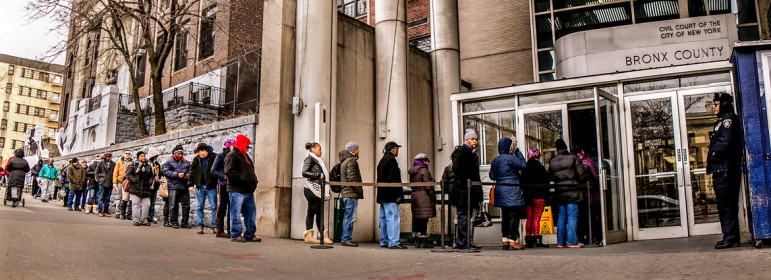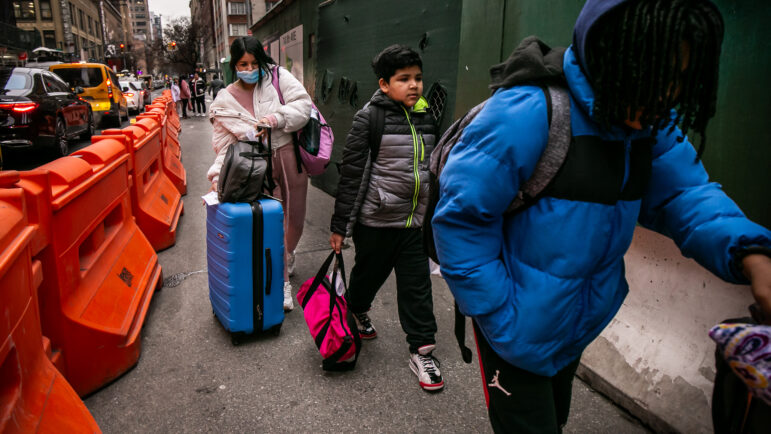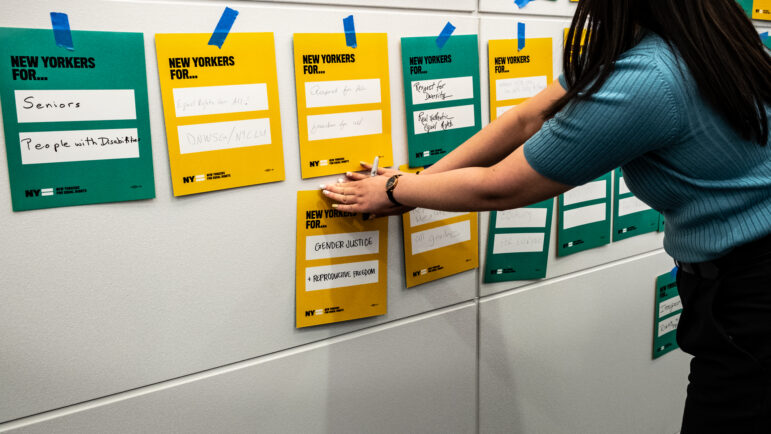
Adi Talwar
A long line of tenants waits to enter Bronx housing court in 2015.As COVID-19 ravages our country, it has once again laid bare the results of generations of racial prejudice and discrimination. According to the New York City Department of Health, Black and Latino New Yorkers make up the vast majority of known COVID-19 cases. From the South Bronx, to East New York, to Far Rockaway and to our community, Harlem, a wealth gap fostered by centuries of the same state-sponsored racism that activists nationwide are fighting against has given rise to increased rates of infection and death during the global pandemic.
Now, as New York City moves through Phase 1 of reopening, we cannot lose sight of these deep-seated inequities as the Office of Court Administration (OCA) plans to reopen the housing courts. It is imperative that any reopening plan account for the pain and wealth disparity our housing policies—among other systems—have inflicted upon these communities.
It is no coincidence the same Black and Latino communities most impacted by the COVID-19 health crisis are the same ones filing in and out of housing court, perpetually threatened with violent, unjust evictions. Any reopening of housing courts must be done in a way that prioritizes the health of the people who work and appear there over the interest of debt collection.
As housing attorneys, we have heard our fellow members of the New York State Bar call for housing courts to reopen and return to business as usual. That means one thing: evictions. As tenants’ attorneys, community members, and neighbors, we can’t help but hear these calls and wonder, why do housing courts need to reopen?
 CityViews are readers’ opinions, not those of City Limits. Add your voice today!
CityViews are readers’ opinions, not those of City Limits. Add your voice today!
New York City housing court is one of the busiest courts in the country, and its very purpose is antithetical to the mitigation of the pandemic. Anyone who has been to New York City housing courts knows that they are most easily defined by the large volume of people, crowded spaces and yelling in the hallways. According to the U.S. Centers for Disease Control and Prevention (CDC), each of these things individually increases the likelihood of transmission of COVID-19. Together, they’re a recipe for disaster.
No landlord, attorney, court staffer or judge has yet made the argument that it is actually safe to open housing courts. On top of that, the reopening of housing courts are, in practice, a resumption of violent evictions of people from their homes; at which point they will join the even more vulnerable on the street or in crowded shelters. To rush to return to “business as usual” is to willingly put Black and Latino communities at risk by needlessly exposing them to the COVID-19 virus and diminishing their ability to protect themselves from infection by social distancing.
Reopening housing courts increases the risk of exposure to tenants, attorneys and court workers and will lead to evictions which will harm low-income minority communities. It is only landlords, who rarely physically appear in court, who benefit from the rush to reopen housing courts. Specifically, it is large landlords, 70 percent of whom own over six rental buildings (and a majority of whom own more than 20 buildings) who will profit off the suffering of our poor Black neighbors. This group was responsible for over 75 percent of evictions in 2018.
The common refrain from the gluttonous real-estate lobby and the OCA is that housing courts must reopen so landlords can collect rent and stave off foreclosure. Advocates for working-class tenants and the homeless understand the fear of someone losing their home because of an unpredictable change in economic circumstance; it is a reality our clients experience every day. The question is: Why are the courts, the state, and the landlords so willing to address this fear by damning the most vulnerable to the same fate?
On balance, the health, safety, and well-being of Black and Latino communities must outweigh the corporate financial interests of big landlords. Through government leadership, mortgages can be forgiven and risk of foreclosure mitigated. However, the lives of our clients, neighbors, and colleagues are irreplaceable, and if they are lost, no amount of government action can mitigate that grief. As we move forward through this public health crisis, the OCA must internalize and apply both the lessons of the pandemic and of Black Lives Matter to the reopening of housing courts. We must treat the housing crisis as a problem that we have the ability to solve, rather than an inevitability.
Anna Luft is a staff attorney and Austen Refuerzo is the supervisor of Right to Counsel in the civil defense practice of Neighborhood Defender Service.









One thought on “Opinion: A Reopened Housing Court Must Protect New Yorkers of Color”
I was in housing court prior to the pandemic. I am worried as my situation has not really changed. Eviction still on the plate for me.